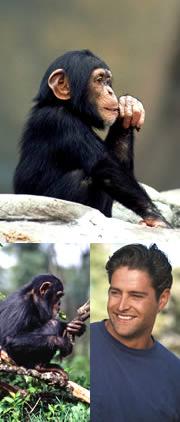Changes imply how our lifestyle is reflected in our genes.

Researchers discovered that genes involved in the senses of smell and hearing differ significantly between humans and chimpanzees. The findings may be the beginning of understanding the differences between us and our closest family relative.
"It reveals to us what types of genes are important for the differences between us," says Michelle Cargill of the biotechnology company that conducted the comparison, Celera Diagnostics in Alameda, California. However, the list does not tell us what makes us human, she warns: "Finding a change in one protein does not tell us how it affects the whole animal."
The human genome and the chimpanzee genome are about 99.2% identical. In the most important parts of the genome, that number rises to 99.5%. However, Cargill and her colleagues believe that they have seen the fingerprint of evolution in these tiny DNA differences.
The researchers compared the sequence of more than 7,500 genes of chimpanzees, humans and mice, collected by each species' genome projects. Aligning the two primate genomes against the mouse genome revealed who had changed more since the split from a common ancestor that the three mammals shared, the human or the chimpanzee.
All DNA sequences change over time with the accumulation of mutations. To trace the influence of evolution, the researchers looked for genes that had changed during the five million years since the split from a common ancestor more than just by chance. More than 1,500 genes were likely affected by selection pressures, the analysis showed.
"This is the first comparison between a human and a chimpanzee on the scale of a whole genome," says geneticist Svante Paabo of the Max Planck Institute for Evolutionary Anthropology in Leipzig, Germany. "It will allow us to arrive at many new and interesting hypotheses about the new characteristics in human evolution."
Nevertheless, some scientists are not sure that the differences being studied are the result of evolution. There are so few differences between humans and chimpanzees, argues evolutionary biologist Adam Eyre-Walker, that comparing individual genes provides almost nothing to analyze.
"My gut feeling is that there is not enough information here," says Eyre-Walker, who works at the University of Sussex, England. He feels that it is better to combine information from many genes.
Of the human genes whose function is known - about half of all genes - almost 50 are related to the sense of smell. Many of them seem to degenerate and become useless. This probably reflects the decreasing importance of the sense of smell in our way of life relative to its importance in the life of chimpanzees.
In addition, the team found changes in 21 human genes, which are related to hearing. "It's tempting to speculate, because it has something to do with language," Paavo says. "Now people will analyze the hearing of monkeys with increasing interest."
Almost eighty genes for protein digestion were found to be different between humans and chimpanzees - perhaps reflecting how the menu of humans has changed since the split from our cousins. Many of these different genes are associated with diseases. A mutation in a gene called tectorin-alpha, for example, causes hearing loss in humans.
